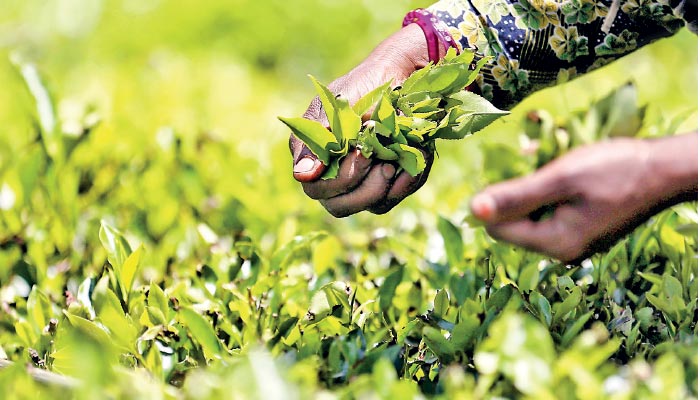Saturday Feb 21, 2026
Saturday Feb 21, 2026
Monday, 7 July 2025 01:52 - - {{hitsCtrl.values.hits}}

 Embracing regenerative agriculture is not merely a feel-good idea or a corporate social responsibility initiative; it is a smart and necessary economic strategy. At its core, it directly confronts the industry’s most pressing financial challenges. It systematically reduces the reliance on expensive, often imported, agrochemicals that have become a crushing burden for many growers. By rejuvenating the soil, it improves long-term yields, creating a buffer against the notoriously volatile prices in the global tea market. This transition offers growers a pathway to both economic resilience and new streams of revenue. It opens previously inaccessible doors to carbon credit markets and allows producers to command sustainability premiums for their certified products
Embracing regenerative agriculture is not merely a feel-good idea or a corporate social responsibility initiative; it is a smart and necessary economic strategy. At its core, it directly confronts the industry’s most pressing financial challenges. It systematically reduces the reliance on expensive, often imported, agrochemicals that have become a crushing burden for many growers. By rejuvenating the soil, it improves long-term yields, creating a buffer against the notoriously volatile prices in the global tea market. This transition offers growers a pathway to both economic resilience and new streams of revenue. It opens previously inaccessible doors to carbon credit markets and allows producers to command sustainability premiums for their certified products
 In the cool mist of the central highlands, the legacy of Ceylon tea still stands proud—a story steeped in flavour, heritage, and a quality that commands global respect. For generations, the emerald slopes of this island nation have produced some of the world’s finest tea. But that legacy is now increasingly fragile. Beneath the beauty of the rolling tea gardens, a crisis is unfolding in the very soil that sustains them. As that soil depletes, production costs rise, and international markets fundamentally evolve, the Sri Lankan tea industry faces a defining question: will it cling to the familiar, yet failing, practices of the past, or will it pioneer a regenerative future and reaffirm its global leadership?.
In the cool mist of the central highlands, the legacy of Ceylon tea still stands proud—a story steeped in flavour, heritage, and a quality that commands global respect. For generations, the emerald slopes of this island nation have produced some of the world’s finest tea. But that legacy is now increasingly fragile. Beneath the beauty of the rolling tea gardens, a crisis is unfolding in the very soil that sustains them. As that soil depletes, production costs rise, and international markets fundamentally evolve, the Sri Lankan tea industry faces a defining question: will it cling to the familiar, yet failing, practices of the past, or will it pioneer a regenerative future and reaffirm its global leadership?.
The path forward is not an academic fantasy; it is already being mapped out on the ground. The good news is that Sri Lanka has already taken the first, critical steps. Halgolla Estate, in a landmark achievement, earned the world’s first-ever Regenagri certification for a tea estate, a move that instantly put the country on the global sustainability map. Not long after, the Lumbini Tea Valley followed, becoming the first group of smallholders in the world to earn the same prestigious certification. These pioneers, operating at different scales, have definitively proven that regenerative agriculture—a holistic method of farming that actively restores soil health, boosts vital biodiversity, and sequesters atmospheric carbon—is a viable model for both large estates and smallholder collectives.
But these isolated success stories, however inspiring, will not be enough to turn the tide. If Sri Lanka is to maintain its competitive edge in export markets that are increasingly and aggressively driven by sustainability, it needs a systemic transformation. That monumental shift requires one thing above all else: clear, consistent, and courageous policy support from the Government.
To be clear, embracing regenerative agriculture is not merely a feel-good idea or a corporate social responsibility initiative; it is a smart and necessary economic strategy. At its core, it directly confronts the industry’s most pressing financial challenges. It systematically reduces the reliance on expensive, often imported, agrochemicals that have become a crushing burden for many growers. By rejuvenating the soil, it improves long-term yields, creating a buffer against the notoriously volatile prices in the global tea market. This transition offers growers a pathway to both economic resilience and new streams of revenue. It opens previously inaccessible doors to carbon credit markets and allows producers to command sustainability premiums for their certified products.
The urgency is underscored by a tectonic shift in international trade regulations. The world is not waiting for Sri Lanka to make up its mind. The European Green Deal, Germany’s rigorous Lieferkettengesetz (Supply Chain Act), and the forthcoming EU Corporate Sustainability Due Diligence Directive are game-changers. These regulations will legally require importers to trace and verify the environmental and social sustainability of their entire supply chains. Independent, verifiable certifications like Regenagri are designed to provide exactly that assurance. Without widespread adoption and alignment, Sri Lankan tea risks a devastating outcome: losing not just its market share to more proactive competitors, but losing market access altogether.
So what should the Sri Lankan Government do? A six-point policy agenda offers a clear road map
First, it must rethink and redeploy agricultural subsidies. Current subsidy schemes often favour the very chemical fertilisers and conventional monoculture practices that degrade the soil and lock farmers into a high-cost system. Instead, the Government must implement targeted, performance-based support for regenerative inputs. This means creating time-bound, results-linked subsidy programs for estates and smallholders who commit to adopting these new methods. These subsidies should support compost production, the cultivation of agroforestry seedlings and shade trees, and the use of cover crops and mulching materials. Crucially, they should not be open-ended handouts, but should be tied to real ecological outcomes, such as measured increases in soil organic carbon or a verifiable reduction in chemical inputs.
Second, the Government must invest in robust extension services and farmer training to close the significant technical know-how gap. Many tea farmers, particularly smallholders, are simply unaware of viable alternatives to the high-input chemical model they have been taught for decades. This is where key institutions like the Department of Agriculture and the Tea Research Institute must step in decisively. The strategy should include placing dedicated regenerative agriculture officers in every tea-producing district, establishing demonstration plots to showcase model practices, and integrating regenerative curricula into farmer field schools and tea factory networks. Partnering with expert organisations like Solidaridad, which has already supported Regenagri implementation in Sri Lanka and India, would ensure global best practices are adapted to local realities.
Third, this transformation cannot rest on public funds alone; it requires Public-Private Partnerships (PPPs) to de-risk investment and scale adoption. A formal PPP framework, perhaps under the Plantation Ministry or the Export Development Board (EDB), could convene stakeholders and coordinate efforts. This would encourage banks to offer preferential green loans to regenerative estates, motivate tea exporters to co-invest in pilot programs to secure their own certified supply chains, and foster collaboration with agritech startups that can provide digital tools for monitoring soil health and biodiversity.
Fourth, Sri Lanka must leverage its leadership with powerful export incentives and branding support. If the nation wants to be recognised as a global leader in regenerative tea, it must help its exporters market that unique distinction. The EDB and Sri Lanka Tea Board should offer export tax incentives for Regenagri-certified tea, feature it prominently in trade delegations and international expos, and develop a “Ceylon Regenerative” brand seal as a powerful sibling to the famed “Pure Ceylon Tea” mark. This branding must target not just bulk buyers, but the high-end specialty tea markets in Europe, North America, and Japan, where ethical sourcing and climate claims are rewarded with significant price premiums and long-term contracts.
Fifth, the Government must actively support participation in the global carbon market. This remains one of the least understood but potentially most lucrative benefits of this transition. Regenagri-certified estates can meticulously measure and verify the carbon stored in their soils and vegetation, which allows them to sell valuable carbon credits on international markets. The Government can facilitate this by formally recognising Regenagri under any future national carbon registry, helping estates navigate complex global standards like Verra or Gold Standard, and creating pooled carbon trading platforms to benefit smallholders. This could provide growers with an estimated $15 to $30 per tonne of CO₂ sequestered, creating a vital new revenue stream.
Finally, for any of this to scale, there must be deep legal and institutional alignment. This requires embedding regenerative agriculture as a core pillar of the National Export Strategy and amending the Tea Control Act to include provisions for sustainable production. A light-touch, enabling regulatory environment that rewards ecological stewardship and supports innovation is all that is needed. Furthermore, the Government should actively channel international development aid, particularly from OECD countries, towards these programs to secure concessional financing and technical assistance.
Sri Lanka has a precious head start, but the window of opportunity is closing fast. While Sri Lanka deliberates, its competitors are acting; India is already aiming to bring 100,000 hectares under certification in the next three years.
This is not just about sustainability; it is about economic survival, global relevance, and intergenerational justice.
The tools are on the table. The pioneers have shown the way.
All that’s needed now is policy support and coordinated action.
Let’s make regenerative tea not just our future—but our signature.
(The author is a sustainability analyst and writer specialising in agroecological transitions in Asia. He is the Managing Director of Solidaridad Asia and a member of its Global Executive Board. An economist by training, his expertise spans sustainability strategy, climate finance, and inclusive value chains. He can be contacted at [email protected].)